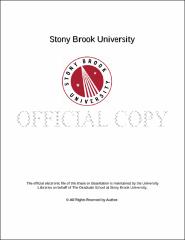| dc.identifier.uri | http://hdl.handle.net/11401/76939 | |
| dc.description.sponsorship | This work is sponsored by the Stony Brook University Graduate School in compliance with the requirements for completion of degree. | en_US |
| dc.format | Monograph | |
| dc.format.medium | Electronic Resource | en_US |
| dc.language.iso | en_US | |
| dc.publisher | The Graduate School, Stony Brook University: Stony Brook, NY. | |
| dc.type | Dissertation | |
| dcterms.abstract | Intensive research has demonstrated that extracellular matrix (ECM) and growth factor (GF) signaling collaborate at many different levels. Through integrins, ECM generates signals that enhance or suppress GF signaling. Some ECM activates GF receptor in the absence of GF. Furthermore, ECM contains growth factor binding-domains (GFBD) that can either sequester or present GF in ways that modify cell response. The ability of ECM to modulate GF signals has important implications in tissue engineering/regenerative medicine, and in devising therapies to treat acute and chronic wounds. Previously in our lab, a novel fibronectin peptide, P12, was shown to bind platelet-derived growth factor BB (PDGF-BB). In vivo experiments showed that P12 can limit burn injury progression, suggesting an active role in cell survival. In my research, I explored the molecular mechanism of P12 effect in adult human dermal fibroblasts (ADHF) under nutrient deprivation, a stress condition that mimics burn injury. In my system, I found that P12 acted as a cell penetrating peptide and redirected ligand-bound PDGF receptors from the clathrin-mediated endocytosis (CME) to a slower, clathrin and dynamin-independent pathway. As a consequence, P12 slowed the internalization and degradation of PDGF-BB/PDGFR-β , augmented its survival signal, and promoted cell survival under nutrient deprivation. My findings demonstrate a new role for extracellular matrix proteins in modulating growth factor signaling and cell survival. | |
| dcterms.available | 2017-09-20T16:51:29Z | |
| dcterms.contributor | Brown, Deborah | en_US |
| dcterms.contributor | Clark, Richard A.F. | en_US |
| dcterms.contributor | Lin, Richard | en_US |
| dcterms.contributor | Zong, Wei-Xing | en_US |
| dcterms.contributor | Entcheva, Emilia. | en_US |
| dcterms.creator | Zhu, Jia | |
| dcterms.dateAccepted | 2017-09-20T16:51:29Z | |
| dcterms.dateSubmitted | 2017-09-20T16:51:29Z | |
| dcterms.description | Department of Biochemistry and Cell Biology. | en_US |
| dcterms.extent | 58 pg. | en_US |
| dcterms.format | Application/PDF | en_US |
| dcterms.format | Monograph | |
| dcterms.identifier | http://hdl.handle.net/11401/76939 | |
| dcterms.issued | 2013-12-01 | |
| dcterms.language | en_US | |
| dcterms.provenance | Made available in DSpace on 2017-09-20T16:51:29Z (GMT). No. of bitstreams: 1
Zhu_grad.sunysb_0771E_11557.pdf: 2567098 bytes, checksum: 402ca58242718aa0d8570ee5ff5a9e98 (MD5)
Previous issue date: 1 | en |
| dcterms.publisher | The Graduate School, Stony Brook University: Stony Brook, NY. | |
| dcterms.subject | Fibronectin, PDGF-BB | |
| dcterms.subject | Biochemistry | |
| dcterms.title | P12, a novel fibronectin peptide, promotes cell survival by augmenting PDGF-BB survival signals | |
| dcterms.type | Dissertation | |

